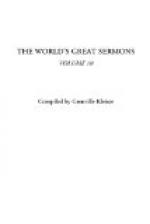But while He did not talk openly to the world about His death, He did not hesitate to speak about it to His nearest friends. As soon as He found a man willing to confess that He was indeed the world’s Messiah, the Son of the living God, He began to initiate His disciples into the deeper mysteries of His mission. “From that time,” Matthew says, “he began to show, to unfold, to set forth the fact that he must suffer many things and be killed.” Peter tried to check Him in this disclosure, but Jesus could not be checked. It is surprising how many times it is stated in the gospels that Jesus told His disciples He must be killed. Matthew says that while they were traveling in Galilee, on a certain day when the disciples were much elated over the marvelous things which He was doing, He took them aside and said “Let these words sink into your ears: I am going to Jerusalem to be killed.” Later on, when they were going through Perea, Jesus took them aside and said, “The Son of man must suffer many things, and at last be put to death.” On nearing Jerusalem His disciples became impatient for a disclosure of His power and glory. He began to tell them about the grace of humility. “The Son of man,” He said, “is come, not to be ministered unto, but to minister, and to give his life a ransom for many.” On the last Tuesday of His earthly life He sat with His disciples on the slope of the Mount of Olives, and in the midst of His high and solemn teaching He said, “It is only two days now until I shall be crucified.” And on the last Thursday of His life, on the evening of His betrayal, He took His disciples into an upper room, and taking the bread and blessing it, He gave it to these men, saying, “This is my body which is given for you.” Likewise after supper He took the cup, and when He had blest it gave it to them, saying, “This is my blood of the covenant which is shed for you and for many for the remission of sins. Do this in remembrance of me.” It would seem from this that the one thing which Jesus was desirous that all His followers should remember was the fact that He had laid down His life for them. One can not read the gospels without feeling that he is being borne steadily and irresistibly toward the cross.
When we get out of the gospels into the epistles we find ourselves face to face with the same tragic and glorious fact. Peter’s first letter is not a theological treatise. He is not writing a dissertation on the person of Christ, or attempting to give any interpretation of the death of Jesus; he is dealing with very practical matters. He exhorts the Christians who are discouraged and downhearted to hold up their heads and to be brave. It is interesting to see how again and again he puts the cross behind them in order to keep them from slipping back. “Endure,” he says, “because Christ suffered for us. Who his own self bore our sins in his own body on the tree.” The Christians of that day had been overtaken by furious persecution. They were suffering all sorts of hardships and disappointments. But “suffer,” he says, “because Christ has once suffered for sins, the just for the unjust, that he might bring us to God.” Certainly the gospel, according to St. Peter, was: Christ died for our sins.




